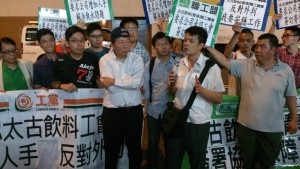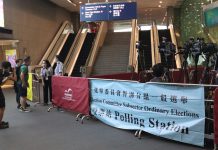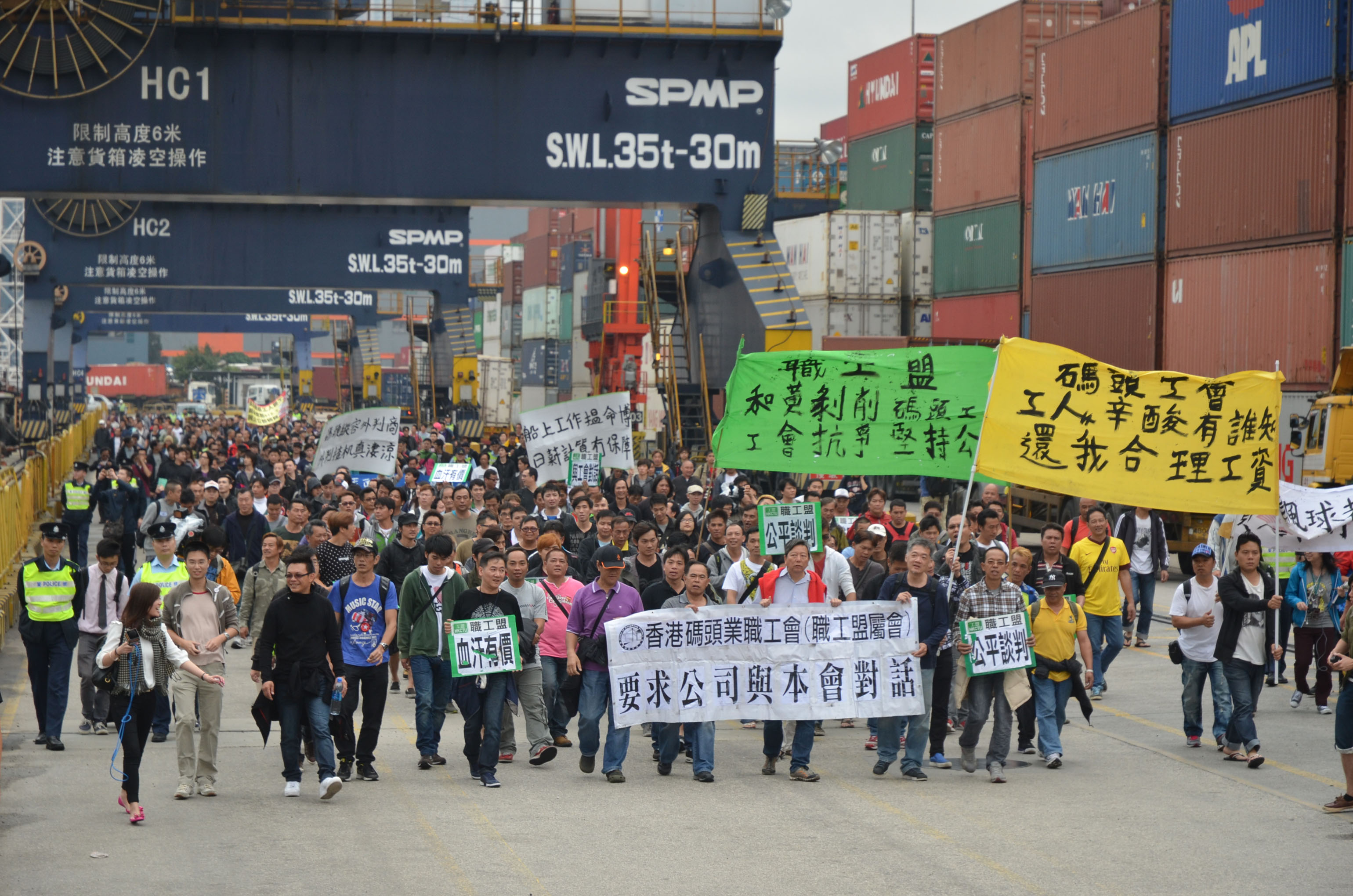Collective bargaining rights remain out of reach for Hong Kong workers
By Brian Yu & Kelly Wong
Stanley Ho Wai-hong will never forget the 40 days that began on March 28 2013. “At eight o’clock in the morning, over one hundred dockworkers blocked the entrance of Terminal Six and stopped the cargo vans from entering the terminal,” says the unionist. “This is how the strike started.”
As the General Secretary of the Union of Hong Kong Dockers, Ho led more than 500 dock workers in the longest strike in Hong Kong history for better pay and working conditions. Their employers were contractors working for Hong Kong International Terminals, a subsidiary of tycoon Li Ka-shing’s Hutchison Whampoa.
It was a David and Goliath scenario and the dockers’ cause earned them widespread public support. People donated tents, food and drinks and daily supplies to sustain the strike. Even when it rained down hard, many supporters put on their raincoats to join the striking workers.

In the end, the workers settled for a 9.8 per cent pay rise and promises of better working conditions, such as meal breaks and toilet breaks, allowing Ho to step back from the frontline. He is still doing union work and carrying out labour education.
Although the dockers managed to get a deal, Ho hopes Hong Kong can implement a collective bargaining law to protect workers’ rights.
Under Hong Kong’s Employment Ordinance, every employee has the right to strike and join a trade union. However, they do not have collective bargaining rights. This means there is no legal responsibility for employers to either enter negotiations with employees or to respond to their demands.
Ho says all three rights are of paramount importance in defending labour rights and the absence of a collective bargaining law leads to many unnecessary strikes and conflicts. He says that since employers are not obliged to participate in negotiations, employees can never bring their grievances and demands to the negotiating table. “Without the collective bargaining mechanism, we have no choice but to go on strike and let more people hear our voice,” says Ho.
That is not to say that Ho thinks a law on collective bargaining would necessarily eliminate or even reduce strikes and conflicts. However, it would at least provide an opportunity for employees and the employers to sit down to rationally discuss their concerns or even reach a consensus. “Why can’t we calmly negotiate in a civilized society?” says Ho.
Another reason to have collective bargaining is to ensure employers strictly follow any agreements made in the negotiation process. In the absence of legislation, employers are not legally bound to follow any verbal agreement reached with a trade union and there are no legal consequences to reneging on it.
Before they went on strike, dock workers’ representatives tried to negotiate with their employers, the contractors. One of the representatives was Ken Lai Ma-kin, who has worked in the terminal for more than 20 years and operates the lifting gear.
Lai recalls the company said they would follow up on workers’ demands after their meeting but no real progress was made. The labour representatives later also handed in a petition but the employers did not respond to it. With dialogue not working, the representatives called on more workers to join the strike.
Lai thinks collective bargaining legislation would put pressure on employers to respect negotiations with their employees. “If we do not put the consensus in black and white, they can deny all promises at any time,” he says.
The irony is that Hong Kong workers did briefly enjoy collective bargaining rights, thanks to a private member’s bill submitted by unionist and lawmaker Lee Cheuk-yan, which was passed in the last session of the pre-handover Legislative Council. Less than four months after the handover, the law was repealed by the Provisional Legislature. The reason given was that it would adversely affect Hong Kong’s competitiveness and attractiveness to overseas investment.
Changes to the rules after the handover mean that it would now be impossible for a lawmaker to table a private member’s bill on collective bargaining. While for its part, the government has no intention to reintroduce the law despite heated debate following the dock strike.







































